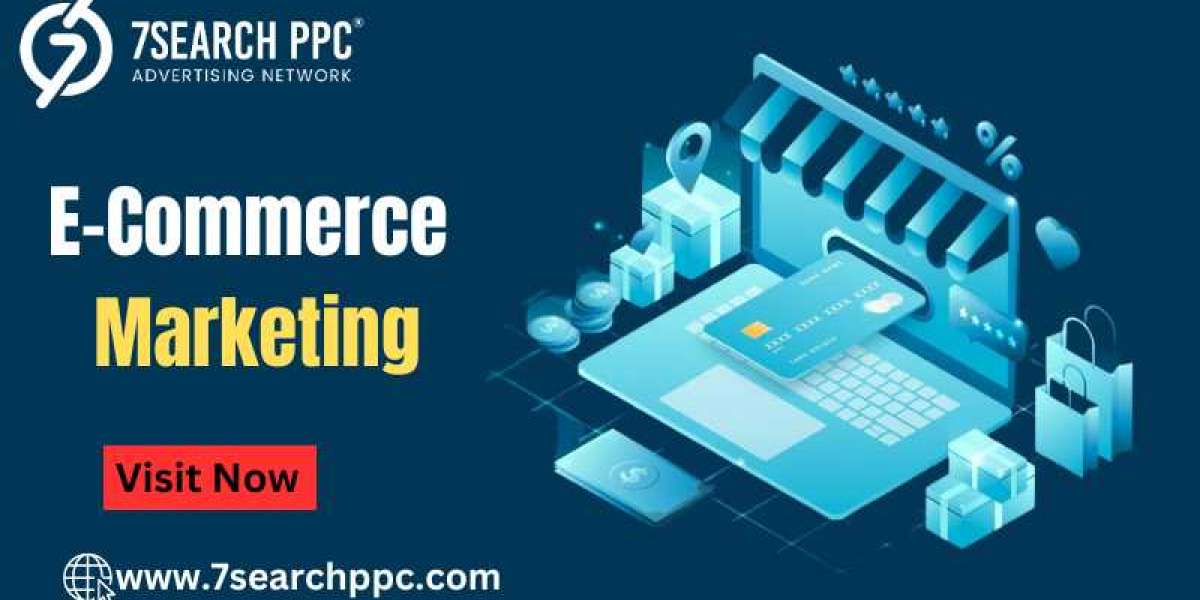In today’s fast-paced digital economy, mastering e-commerce marketing is essential for any business looking to succeed online. With thousands of online stores vying for attention, businesses must find creative and effective ways to stand out and connect with their target audience. This guide explores proven strategies that can significantly boost your sales, focusing on key aspects of e-commerce marketing such as the use of an e-commerce ads agency, choosing the best e-commerce ad platform, and mastering e-commerce paid advertising.

What is E-Commerce Marketing?
E-commerce marketing refers to the use of various online strategies to drive traffic to an online store, convert that traffic into paying customers, and retain those customers post-purchase. It encompasses a range of marketing tactics, including search engine optimization (SEO), content marketing, paid advertising, social media marketing, email marketing, and more.
Success in e-commerce marketing hinges on understanding your audience, offering an excellent user experience, and leveraging data to optimize your campaigns continuously.
Why E-Commerce Marketing Matters
The significance of e-commerce marketing lies in its ability to:
- Increase visibility: By utilizing digital marketing strategies, you can make your store more discoverable to potential customers.
- Drive targeted traffic: Through paid advertising, SEO, and content strategies, e-commerce businesses can attract the right audience, increasing the likelihood of conversion.
- Build customer relationships: Marketing efforts such as email campaigns and social media interactions create ongoing engagement, leading to repeat purchases.
Proven E-Commerce Marketing Strategies to Boost Sales
Leverage E-Commerce Paid Advertising
E-commerce paid advertising is one of the most effective ways to quickly generate traffic to your online store. Paid ads can appear on search engines, social media platforms, or other websites that your target audience visits.
There are various types of paid advertising methods in e-commerce marketing:
- Pay-per-click (PPC) advertising: This involves paying for your ad to appear at the top of search engine results pages (SERPs). With PPC ads, you only pay when someone clicks on your ad.
- Social media ads: Platforms like Facebook, Instagram, and TikTok offer advanced targeting options, allowing you to show your ads to specific demographics based on location, interests, and behavior.
- Display ads: These are banner or sidebar ads shown on websites within an ad network, targeted to users based on their browsing history.
The benefits of paid advertising include increased brand awareness, the ability to target very specific audiences, and the opportunity for quick traffic boosts.
Choosing the Best E-Commerce Ad Platform
Selecting the best e-commerce advertising platform depends on your business goals and audience. Here are some of the top platforms to consider:
- Google Ads: Ideal for search-based intent, allowing you to target potential customers when they actively search for your products or related terms.
- Facebook Ads: Offers deep audience targeting, making it perfect for businesses looking to engage users based on their interests, behavior, and demographics.
- Instagram Ads: Effective for visually-driven products and audiences who respond to stunning visuals and short videos.
- Amazon Ads: Particularly useful for e-commerce businesses selling on Amazon, providing high conversion rates by targeting shoppers already in the buying mindset.
- TikTok Ads: An emerging platform that works well for brands targeting younger, trend-conscious audiences.
Work with an E-Commerce Ads Agency
Running a successful e-commerce marketing campaign can be complex and time-consuming, which is why many businesses opt to work with an e-commerce ads agency. These agencies specialize in creating, optimizing, and managing paid ad campaigns on various platforms, allowing business owners to focus on other aspects of their operations.
The benefits of partnering with an agency include:
- Expertise: Agencies have the experience to know which ad platforms and strategies work best for your niche.
- Time savings: They handle all aspects of campaign management, from creation to monitoring and reporting.
- Optimized ROI: Agencies use data-driven insights and testing to ensure your budget is spent efficiently and profitably.
Utilize Email Marketing
While paid advertising is excellent for acquiring new customers, email marketing is one of the best tools for retaining them. Building a list of engaged email subscribers allows you to maintain direct communication with your customers.
Here are a few ways to use email marketing to boost your e-commerce sales:
- Personalized campaigns: Send tailored emails based on customers’ past purchases or browsing behavior, offering product recommendations and discounts.
- Cart abandonment reminders: Use automated emails to remind customers to complete their purchase after leaving items in their cart.
- Exclusive offers: Reward loyal customers with early access to sales, exclusive deals, or special product releases.
Email marketing is not only effective but also cost-efficient, with a high return on investment (ROI) compared to other forms of digital marketing.
Implement Search Engine Optimization (SEO)
SEO is a cornerstone of e-commerce marketing that focuses on improving your website’s visibility in organic search engine results. Optimizing your site for SEO can drive free, high-quality traffic to your store over time.
Key elements of e-commerce SEO include:
- Keyword research: Identify keywords that your target audience is searching for, focusing on both short-tail and long-tail terms.
- On-page optimization: Ensure your website is optimized for the user experience with fast loading times, mobile responsiveness, and clear calls to action. Make sure to include keywords naturally in titles, product descriptions, and meta tags.
- Content marketing: Develop content such as blog posts, product guides, and how-tos that target valuable keywords and educate your customers about your products.
SEO is a long-term strategy that requires consistent effort, but the payoff in organic traffic and brand credibility can be significant.
Use Retargeting to Re-engage Visitors
Retargeting ads is a highly effective advertising tactic that shows your ads to people who have visited your site but haven’t completed a purchase. This can be done using e-commerce paid advertising platforms such as Google or Facebook.
Benefits of retargeting include:
- Increased conversion rates: Retargeting reminds potential customers about your products, increasing the likelihood that they’ll return and complete their purchase.
- Custom messaging: You can create ads specifically targeted to customers at different stages of the buying journey, from browsing to cart abandonment.
Create Compelling Social Media Campaigns
Social media is an integral part of e-commerce marketing, allowing brands to connect with their audience on a personal level. A well-executed social media strategy can boost engagement, drive traffic, and increase sales.
Some effective social media tactics include:
- Influencer partnerships: Collaborate with influencers in your niche to promote your products to their audience.
- User-generated content: Encourage customers to share photos or videos of them using your products, creating authentic content that can be repurposed in your marketing campaigns.
- Contests and giveaways: Run contests that require participants to follow your brand, tag friends, or share content, increasing your social reach and engagement.
Optimize for Mobile Commerce
With more than half of e-commerce sales occurring on mobile devices, your online store must be fully optimized for mobile users. A mobile-friendly site provides a seamless user experience, making it easier for customers to browse, shop, and checkout on their phones or tablets.
Some tips for mobile optimization include:
- Fast loading times: Ensure your site loads quickly on mobile to prevent users from bouncing.
- Responsive design: Use a mobile-responsive website design that adapts to different screen sizes.
- Simplified checkout: Streamline the mobile checkout process by minimizing the number of steps and offering popular payment options such as PayPal, Google Pay, and Apple Pay.
Conclusion
Effective e-commerce marketing is the key to standing out in a crowded digital marketplace. Whether you’re leveraging e-commerce paid advertising, working with an e-commerce ads agency, or optimizing your site for SEO and mobile, the right strategies can significantly boost your sales and grow your business.
By choosing the best e-commerce ad platform, focusing on targeted ads, creating engaging content, and maintaining communication with your customers, you can build a thriving e-commerce business that consistently drives revenue.
FAQ
What is e-commerce marketing?
Ans. E-commerce marketing is the process of promoting an online store and its products through digital marketing strategies such as SEO, paid ads, email marketing, and social media.
What is the best e-commerce ad platform?
Ans. The best e-commerce ad platform depends on your goals and target audience. Popular platforms include Google Ads for search-based intent, Facebook and Instagram Ads for social media engagement, and Amazon Ads for high-conversion shopping.
How can an e-commerce ads agency help my business?
Ans. An e-commerce ads agency can manage your paid advertising campaigns, optimize your ROI, and save you time by handling the complexities of ad creation, targeting, and analysis.
Why is SEO important for e-commerce?
Ans. SEO helps increase the organic visibility of your website in search engines, driving free, high-quality traffic to your store over time. A well-optimized site can boost your rankings, resulting in more visitors and higher sales.
What is retargeting in e-commerce marketing?
Ans. Retargeting is a type of paid advertising that shows ads to people who have visited your website but did not make a purchase. This strategy helps bring them back to your site to complete their transaction.


